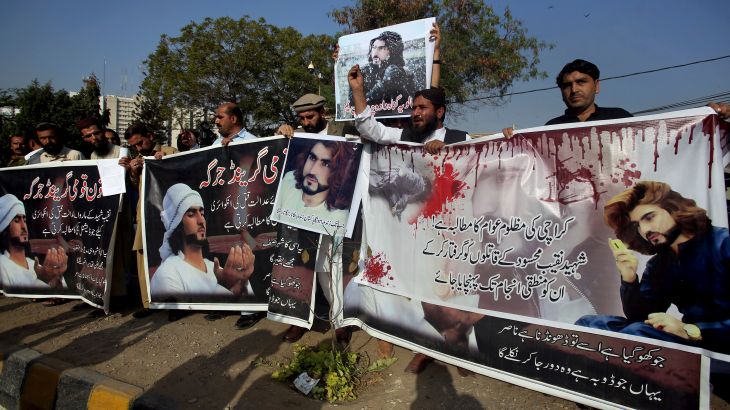Pakistani court acquits police in Naqeebullah Mehsud murder case
Family says it will appeal verdict in 2018 killing of aspiring model in Karachi that sparked protests.

Islamabad, Pakistan – A court in Pakistan has acquitted 18 police officers, including a former senior police official, over the 2018 killing of a Pashtun man in Karachi that triggered protests and a social media outcry.
Naqeebullah Mehsud, an aspiring model and a textile factory worker, was fatally shot along with three other people during what police described as a raid on a hideout of the Tehreek-e-Taliban Pakistan (TTP) armed group. Mehsud’s family and the TTP denied that the 27-year-old was a member of the group.
Keep reading
list of 4 itemsPakistani police detain MP, activists at Pashtun rights rally
Why is Pakistan’s Pashtun movement under attack?
PTM is on a peaceful quest to free all Pakistanis from oppression
On Monday, the “anti-terrorism” court in Karachi said the prosecution was unable to provide substantial evidence against Rao Anwar, a former senior superintendent of police in the southern city, and 17 other defendants.
It also said the prosecution was unable to prove that Mehsud and the three others were kidnapped and subsequently shot in a “fake encounter” by Anwar and his team in January 2018.
A detailed verdict is expected to be issued at a later date.
Today's judgment will be appealed before the Honorable High Court by the legal hiers of Naqeeb Mehsud. https://t.co/S7hRXCxJDZ
— M. Jibran Nasir 🇵🇸 (@MJibranNasir) January 23, 2023
Jibran Nasir, the lawyer representing Mehsud’s family, said it would appeal the verdict, which he called a “travesty of justice”.
“Those who provided political patronage to Rao Anwar and exerted pressure in the proceedings to weaken the prosecution case fail to understand how with every such injustice our governance structure and the social contract between the citizens and the state is eroding and crumbling away,” Nasir told Al Jazeera.
He said the legal team had made public its apprehensions when prosecution witnesses began to waver about their statements and important documents “went missing”.
‘Fighting for justice’
Alam Sher Mehsud, Naqeebullah’s younger brother, expressed disappointment about the verdict and said his family would continue “fighting for justice at every forum”.
“It has been five years since my brother died,” he told Al Jazeera. “We have suffered so much and faced so many hardships. So many people promised we will get justice, but regrettably, I have to say, we saw justice walk out of court today. My father, who died while fighting for this case, kept saying until his last breath to seek justice.”
Mohsin Dawar, a member of Pakistan’s National Assembly, also condemned the acquittal.
“This verdict captures the weakness of the state that a person who is declared to have killed Naqeeb so easily gets acquitted,” Dawar told Al Jazeera.
Dawar was referring to a report by a joint investigation team that was formed on the orders of Pakistan’s Supreme Court. The April 2018 report held Anwar and his subordinates responsible for the killing of Mehsud and the three others.
“Verdicts such as these weaken our nation’s faith in courts, in justice itself,” Dawar said. “This is really dangerous for the state and impact society in a very bad manner.”
But Anwar spoke to a local television station after the court judgement and expressed his happiness that the “fake allegations” against him were proven wrong.
The killing of Mehsud – who hailed from Pakistan’s South Waziristan area, a tribal district bordering Afghanistan – triggered a massive backlash against police, as well as a widespread debate about “fake police encounters” and the authorities’ failure to tackle them.
Activists with the Pashtun Tahaffuz Movement rights group organised sit-ins and demonstrations demanding justice over the killing.
In January 2019, an “anti-terrorism” court in Karachi quashed the charges filed by the police against Mehsud and the three others killed, which accused them of being TTP members.
Two months later, Anwar and at least 17 of his subordinates were indicted over the killing.
Anwar himself appeared before the court in November to record his testimony, in which he denied any involvement in the case.